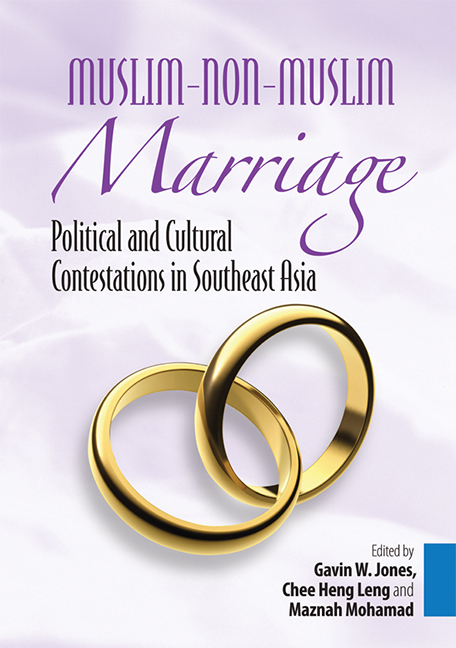Book contents
- Frontmatter
- Contents
- Preface
- The Contributors
- Glossary
- Introduction
- SECTION I Political and Legal Contestations
- Chapter 2 Trapped between Legal Unification and Pluralism: The Indonesian Supreme Court's Decision on Interfaith Marriage
- Chapter 3 Private Lives, Public Contention: Muslim-non-Muslim Family Disputes in Malaysia
- Chapter 4 Legal Aspects of Muslim-non-Muslim Marriage in Indonesia
- Chapter 5 The Politico-Religious Contestation: Hardening of the Islamic Law on Muslim-non-Muslim Marriage in Indonesia
- SECTION II Lived Realities
- SECTION III Perspectives
- Index
Chapter 2 - Trapped between Legal Unification and Pluralism: The Indonesian Supreme Court's Decision on Interfaith Marriage
from SECTION I - Political and Legal Contestations
Published online by Cambridge University Press: 21 October 2015
- Frontmatter
- Contents
- Preface
- The Contributors
- Glossary
- Introduction
- SECTION I Political and Legal Contestations
- Chapter 2 Trapped between Legal Unification and Pluralism: The Indonesian Supreme Court's Decision on Interfaith Marriage
- Chapter 3 Private Lives, Public Contention: Muslim-non-Muslim Family Disputes in Malaysia
- Chapter 4 Legal Aspects of Muslim-non-Muslim Marriage in Indonesia
- Chapter 5 The Politico-Religious Contestation: Hardening of the Islamic Law on Muslim-non-Muslim Marriage in Indonesia
- SECTION II Lived Realities
- SECTION III Perspectives
- Index
Summary
INTRODUCTION
The goal of legal uniformity in Indonesia threatened to sweep away the plurality of laws that people living in this multicultural and multireligious society were familiar with. This at least appeared to be the case on paper, when the new Marriage Law (Law No. 1 of 1974) appeared to ignore a number of issues related to interpersonal relations that concerned people of different religious backgrounds. Thus, although on the basis of the constitution, religions and their values were recognized as valuable sources of family law, in practice, the Marriage Law failed to do just this. It is perhaps ironic that the state's recognition of religious pluralism did not lead to more explicit rules on how to deal with plurality in the domain of personal law. It was as if the state could only conceive of the multireligious nature of its citizens in theory, but not in practice.
One of the biggest issues in this respect was the complicated problem of interfaith marriage. This involves a marriage between two persons having different religious affiliations. For this chapter, the focus will be on marriages between Muslims and non-Muslims. This is because our interest is primarily in identifying the state's attitude towards non-state normative orderings and especially the teachings of Islamic law, given their influence on the majority Muslim population. It is also by analysing such cases of interfaith marriage that we can see how the state has been able to resolve instances of conflict among the different marital traditions.
For this reason, the discussion will be focused on seeing the arguments of the Supreme Court's judges in the conflicts of interfaith marriage brought to the court. The well known case of Andi Vony vs. State at the end of the 1980s will be presented specifically as one case study of interfaith marriage in society and how the state, through its justice institutions, gives its response. The background to the legal problems of that case will also be explained in order to show the real nature of the conflict in Indonesia, especially within the framework of the state's programme of legal nationalization.
- Type
- Chapter
- Information
- Muslim-Non-Muslim MarriagePolitical and Cultural Contestations in Southeast Asia, pp. 33 - 58Publisher: ISEAS–Yusof Ishak InstitutePrint publication year: 2009

